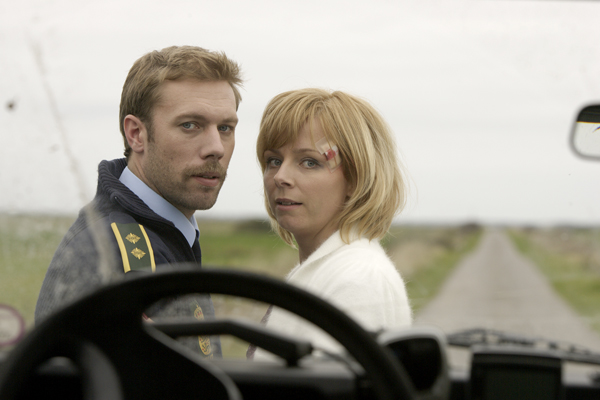|
Reviews of Recent Independent, Foreign, & Documentary Films in Theaters and DVD/Home Video

TERRIBLY HAPPY For all its faults, Terribly Happy¸ Denmark’s neo-noirish submission for this year’s Foreign Language Oscar is a welcome respite from the sometimes self-consciously serious prestige pictures that category brings to mind. After suffering some kind of nervous breakdown, Danish cop Robert Hanson (Jakob Cedergren) is posted to a small town in Southern Jutland where he can cool off for a spell before resuming his life in Copenhagen. But something is obviously off about the place—a bleak, muddy flatland where all troubles, or rather troublemakers, seem to end up the in the bog (as apparently bottomless as that tooth-lined pit from Return of the Jedi). Naturally, the teetotaler rubs the townsfolk the wrong way. Unlike the laidback old marshal he has replaced, Hanson is strictly by the book. He won’t souse with the yokels at the bar, and has no interest in playing cards with a trio of the town’s leading, and creepiest, denizens: a shifty doctor, a Lutheran priest, and a storekeeper. Besides, the villagers prefer to handle problems locally—slapping underage shoplifters rather than sending them to jail and, presumably, trotting miscreants off to the bog. At first, Hanson balks at the locals’ “traditions,” but soon enough he gets entangled in true noir fashion: He falls hard for a slatternly blonde (Lene Maria Christensen) with a grudge against her loutish husband, the town thug, who smacks her and everyone else around. If that weren’t enough, he wears cowboy hats and bolo ties—even in remotest Scandinavia, it seems redneck bullies favor the usual accoutrements.
Sure, Terribly Happy has its share of quirk—the blonde’s young
daughter carts an eerily creaking baby stroller through the village
streets at night, presumably when her mom’s being beaten. But the movie,
directed, and co-written by third-time filmmaker Henrik Ruben Genz, never
becomes precious. And it borrows more than a few tricks from the Coen
brothers’ Fargo: a rather cruel black humor; an uncertainty of
mood; and beneath the violence and weirdness, a soft spot for backwater
values. Like Fargo, the movie, adapted from Erling Jepson’s
novel, even opens with a claim that it’s based on a true story. As with
Fargo, that’s likely part of the joke, though it probably helps
lull the viewer into accepting a series of outrageous and bloody
coincidences needed to jolt the film through its implausible last act.
Brendon Nafziger
|

